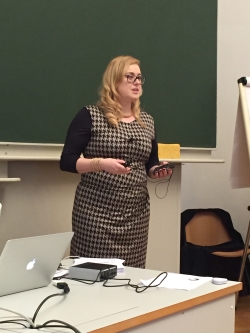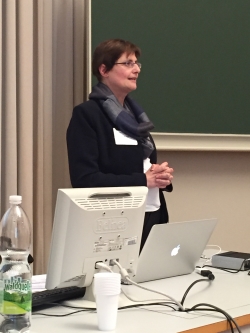Dear Readers,
Jusletter IT exists for more than 5 years now, in front of you is the 19th issue. Podcasts are integrated in Jusletter IT since May 2015, an extensive archive for the IRIS proceedings, jubilee publications have been issued... This is, at this stage, the most comprehensive corpus of knowledge regarding IT and law that is available via search engines and meta data throughout the world and time. Legal services are being developed with increasing technological support (up to the so-called «expert system») and are aiming at a global market; with plenty of regional submarkets. Various legal questions are arising new or in modified context. The IT is seen as the factor for cost saving and quality improvement worldwide; outsourcing is to be seen as a very limited option, especially in German-speaking markets.
In this connection, Jusletter IT dedicated itself to interdisciplinarity and comprehensive coverage of all topics around IT and law that are important for the digital lawyer.
In the last special issue of Jusletter IT on 21 May 2015 we took different approaches to the topic Big Data. The main point is – as in many other sectors – data protection. This, besides the various topics around IT and law – E-Commerce, anti-terror-laws, E-Justice et cetera –, won’t let us go in this issue too.
As an introduction, Rolf H. Weber summarizes the main elements of the European General Data Protection Regulation published in June 2015 by the European Commission. As essential innovations, the strengthening of the digital single market by a harmonised level of data protection is paramount, alongside the information rights, the right «to be forgotten» and the right to data portability, new regulations regarding the preventive data protection and the transnational data transmission. He draws conclusions in view of the ongoing revision of the data protection law in Switzerland.
Carlo Piltz turns his gaze to Germany and to the decision of the Privacy Commissioner of Hamburg, who has issued an administrative order concerning Facebook Ireland Ltd., in which he, inter alia, obligates the corporation to permit the pseudonymous use of its service. The necessity of a clear name in social networks violates the German data protection legislation.
What happens with my Facebook account or my data in the Cloud after my death? How is my «digital inheritance» handled? Rolf H. Weber and Lennart Chrobak are discussing questions regarding the legal assignment of data in lifetime and after death. Taking into account the legal frameworks of property, inheritance and obligation law, the question of how far the Swiss law is able to do justice to the phenomena of digital dying and inheriting and which adaption possibilities are to be considered for the future is discussed.
Paweł Szulewski also considers the transferability of digital assets in the case of death. Based on examples of Facebook, Google and Yahoo!, he refers to the relevant legislation gap in the European Union, at the same time presents non-legal solutions and gives an overview to the US approach to solving the problem.
Sandra Husi-Stämpfli asks «Technology is galloping forward – where is the law?». She examines the technical devices moving into the administrative life and how they should be dealed with. In doing so, she urges, that a rethinking regarding assuming responsibility within the administration must happen as well as a serious conception and realisation of a cantonal IT-Governance.
Peter Parycek, Johann Höchtl and Bettina Rinnerbauer are addressing Big Data analyses in administration and their being in line with the data protection law. Adducting the «Use Case» of the register-based census in Austria, they draft a first proposal for the evaluation of administrative data through a new process in conformity with the law.
Subsequently to his article of May 2014 (Der Einsatz von GovWare in der Schweiz, in: Jusletter IT 15 May 2014), Thomas Hansjakob highlights the current developments of the revision of Art. 269ter Criminal Procedure Code within the frame of the ongoing revision of the Federal Mail and Telecommunications Monitoring Act. Following the Council of States, the National Council also wants to permit the use of GovWare («Staatstrojaner») in future.
In Austria, the topic of surveillance for combating criminality is also being hotly debated. Rolf-Dieter Kargl scrutinizes the neuralgic points in the legal system and presents the connection between private companies’ obligations to cooperate, e.g. based on the E-Commerce-Law and the Telecommunications Law, and powers of authorities according to the Code of Criminal Procedure. In addition, he provides an outlook towards future steps to the formation of a «catalogue of measures for the evaluation of anti-terror-laws».
In his judgement review, Paul Bernal focuses on the (ir-)reconcilability of liberty rights and surveillance. He comments on the judgement of February 2015 by the UK Investigatory Powers Tribunal, which ruled that the data sharing between the US and UK had been unlawful.
Daniela Nüesch summarizes the eighth Swiss conference regarding data protection, which took place on 28/29 May 2015 in Freiburg i.Üe. (Switzerland) and focused on «Big Data and Data Protection».
Virtual currencies have been a subject discussed at length (also see Helgo Eberwein / Árpád Geréd, Bits & Coins, in: Jusletter IT 26 February 2015, Helgo Eberwein / Arthur Stadler / Anna-Zoe Steiner, Bitcoins – Rechtliche Aspekte einer virtuellen Währung, in: Jusletter IT 20 February 2014). In this context, Vlad Dan Roman asks, if the regulation can keep up with the rapid distribution and the frequently appearing new providers.
Susanne Forizs and Tamás Forizs concentrate themselves on the suggestion for a Regulation of the European Parliament and Council for measures for open Internet and amending the Regulation on roaming on public mobile communication networks within the Union. The effects on the customer contract in terms of special agreements, binding new minimum contents for contracts or guarantee are paramount in this analysis.
With the strategic initiative «Justiz 3.0», the completely digital file management will be realised until 2020, to be able to meet the requirements regarding a service oriented justice, both for the public and the staff. Martin Schneider and Thomas Gottwald present the individual points.
In the end, Federico Costantini theoretically deals with the topic «search for meaning» and legal ontologies – accompanied by individual practice examples.
According to Pierre Brun’s recension, the «Leitfaden Information Governance» (guide to information governance) in its new edition is a welcome and comprehensive tool for practitioners. It shows tangible solutions for ensuring the correct and regular handling of business information resources.
As usual, you can also find the TechLawNews of Daniel Ronzani and Simon Schlauri and other interesting news about IT and law in this issue.
Additionally, this issue contains podcasts, recorded in line with the IRIS 2015 on the topic Co-operation. These perfectly complement single articles of the Jusletter IT issue of 26 February 2015.
- Erich Schweighofer, Rechtsdatalystik – Versuch einer Teiltheorie der Rechtsinformatik (Podcast)
- Christine Kirchberger, Kooperation von Rechtsinformation und AnwenderInnen (Podcast)
- Iris Kraßnitzer, Medienneutrale Datenaufbereitung und kooperative Mehrfachnutzung von Kollektivverträgen (Podcast)
- Margit Vetter, «Google Like» Search in juristischen Datenbanken. Umsetzung bei Verlag Österreich (Podcast)
- Jörg Reichert, Recherchefunktionen und Anwenderverhalten in juris.de (Podcast)
- Pascale Berteloot, Anmerkungen zur neuen EUR-Lex (Podcast)
- Angela Stöger-Frank, Der Richter wird zum Autor. Titel, Abstract, korrekte Zitate: Ein Gegengeschäft oder Aufwand? (Podcast)
- Hanna Maria Kreuzbauer, Kooperation (Podcast)
We wish you a fascinating reading and are looking forward to greet you again on 10 November 2015 for the next issue of Jusletter IT on the topic of E-Justice.
Vienna / Bern, September 2015
Data Protection
E-Commerce
Telecommunications Law
E-Justice
Legal Information & Legal Search Technologies







Notes on the General Topic IRIS 2015: Co-operation

IT-Governance
TechLawNews by Ronzani Schlauri Attorneys
News
 Jusletter IT
Jusletter IT